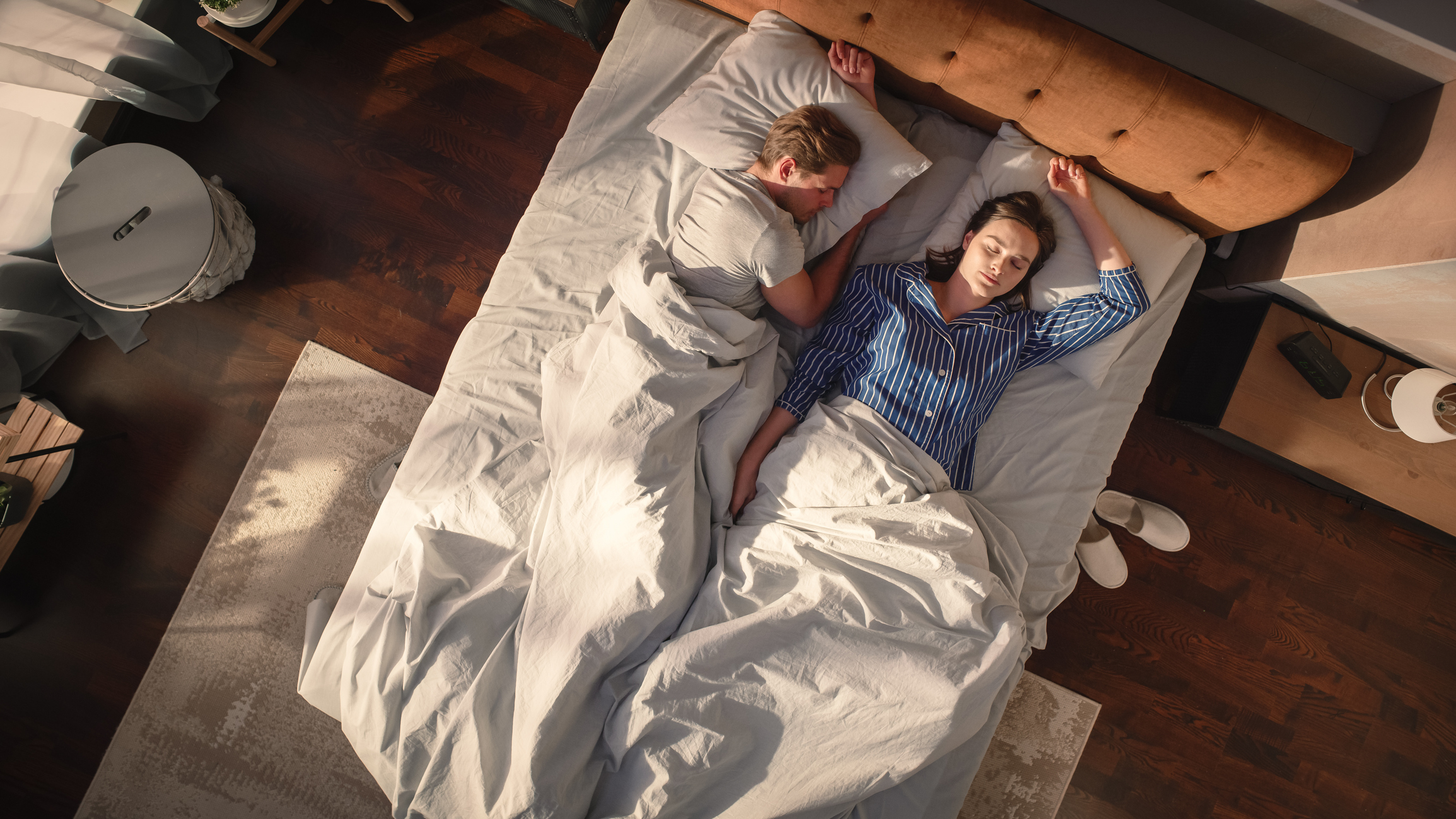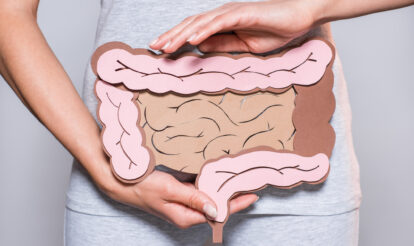
How sleep affects gut health (and how to improve both)
How sleep affects gut health (and how to improve both)

We spend about a third of our lives sleeping – or trying to.
Sleep is essential for recovery, but its impact on gut health is only now becoming clear. The gut and brain are closely connected, and poor sleep can disrupt gut bacteria – just as an imbalanced gut can interfere with sleep.
Healthy sleep patterns, on the other hand, may support your gut health , which in turn can benefit nearly every other bodily system.
Circadian rhythm and gut health
Your gut microbiome follows a daily rhythm. Key bacteria like Lactobacillus and Bacteroides fluctuate based on meal timing, diet, biological clock, and even gender.[1] Poor quality sleep – whether from late nights, shift work, caffeine, stress, or other factors – disrupts this rhythm. Over time, irregular circadian rhythm and sleep loss can lead to dysbiosis: an imbalance of healthy balance of gut bacteria and reduced microbial diversity. This in turn triggers inflammation and impairs metabolic function and the immune system.
Dysbiosis also affects neurotransmitter balance, potentially upsetting healthy sleep patterns and normal mood, creating a vicious cycle.[2]
Sleep deprivation, hormones, and microbes
Lack of sleep raises norepinephrine (a stimulating hormone) and lowers melatonin, the “sleep hormone”. Melatonin has a key role in supporting the gut microbiome by increasing microbial diversity and strengthening gut barrier integrity.[3]
However, many aspects of modern life can suppress melatonin production, such as artificial light from devices, medications, irregular bedtimes, and ageing.[4],[5] Lower levels of melatonin not only make it more difficult to fall asleep but also cause disharmony in the gut. Reduced melatonin causes gut microbiota dysbiosis, accompanied by gut inflammation and increased gut permeability (also known as Leaky Gut).[6]
As sleep deprivation continues, numbers of beneficial gut bacteria such as Bacteroides decline, while harmful bacteria such as Aeromonas increase.
How gut health affects sleep
Melatonin is largely produced in the gut: levels here are around 400 times higher than in the blood and pineal gland.[9] The gut microbiota produces enzymes that help synthesise melatonin from tryptophan, an amino acid.
However, dysbiosis can cause disruptions in tryptophan breakdown which contributes to an inflammatory response, potentially affecting immune homeostasis, neurotransmission, and gut-brain communication.[10] As a result, melatonin levels can decline, making it even more difficult to fall asleep and stay asleep. Gut inflammation can also weaken the blood-brain barrier, allowing inflammatory compounds to disrupt brain function, mood, and sleep.[11]
How to improve your sleep for a better gut
The bi-directional nature of sleep patterns and gut microbiome means that improving one may help the other. Here are some evidence-based tips to support both your gut health and your sleep habits.
Sleep hygiene recommendations:
- Maintaining a regular sleep schedule and managing light exposure is essential for aligning the circadian rhythm.[12] Get up and go to bed at the same time every day (including on weekends and holidays) ensuring at least seven hours of sleep each night.
- Create a bedtime routine that helps you to relax and prepare for sleep. Your bedroom should be cool, quiet, and dark. Limit your use of electronic devices and your exposure to bright light in the hour before bed to help promote melatonin release. Instead, read a book, and practise meditation or deep breathing. Or consider blue-light blocking programs on your devices or glasses to wear.
- Aim to finish dinner at least two hours before going to bed. Avoid meals that are spicy or high in fat or sugar as these can cause indigestion and disrupted sleep. If you are hungry before bedtime, eat a light, healthy snack like a banana (rich in potassium), almonds (a good source of protein) or cherries (a good source of melatonin).
- Avoid strenuous exercise in the evenings as this can lead to hyperarousal during sleep and higher levels of cortisol, the stress hormone.[13]
Dietary recommendations:
- Minimise caffeine intake, especially in the afternoon and evening. Caffeine is a stimulant and has been shown to reduce total sleep time by at least 45 minutes.[14]
- Minimise alcohol, especially before bedtime. Alcohol affects normal sleep phases and interferes with daytime alertness.[15] damage to the gut lining.[16]
- Eat a diet rich in whole foods: fresh fruits, vegetables, legumes, nuts, and lean meats. Whole foods are a source of dietary tryptophan and melatonin, and regular consumption supports healthy sleep.[17] Whole foods are also high in fibre, which is fermented by gut microbes into short-chain fatty acids (SCFAs) that provide anti-inflammatory and immune-supporting substances and help regulate circadian rhythms.[18]
- Add fermented foods to your diet. Sauerkraut, miso, unsweetened yoghurt contain small amounts of beneficial bacteria as well as other nutrients that can support the gut microbiome.[19]
- Take a broad-spectrum probiotic supplement. Probiotics are a concentrated source of beneficial bacteria that can help restore and support the gut microbiome. Choose a product that provides multiple species and at least 25 billion CFU (colony-forming units). Ideally, a probiotic supplement should also have acid-stable delivery technology to ensure the contents reach the intestines.
This information is provided for educational purposes only and is not a substitute for professional medical advice. Always seek the guidance of your physician or qualified healthcare provider with any questions you may have regarding your health or a medical condition.
References
[1] Li, Y., Hao, Y., Fan, F., & Zhang, B. (2018). The Role of Microbiome in Insomnia, Circadian Disturbance and Depression. Frontiers in psychiatry, 9, 669. https://doi.org/10.3389/fpsyt.2018.00669
[2] Li, Y., Hao, Y., Fan, F., & Zhang, B. (2018). The Role of Microbiome in Insomnia, Circadian Disturbance and Depression. Frontiers in psychiatry, 9, 669. https://doi.org/10.3389/fpsyt.2018.00669
[3] Sun, J., Fang, D., Wang, Z., & Liu, Y. (2023). Sleep Deprivation and Gut Microbiota Dysbiosis: Current Understandings and Implications. International journal of molecular sciences, 24(11), 9603. https://doi.org/10.3390/ijms24119603
[4] Chang, A. M., Aeschbach, D., Duffy, J. F., & Czeisler, C. A. (2015). Evening use of light-emitting eReaders negatively affects sleep, circadian timing, and next-morning alertness. Proceedings of the National Academy of Sciences of the United States of America, 112(4), 1232–1237. https://doi.org/10.1073/pnas.1418490112
[5] Anghel, L., Baroiu, L., Popazu, C. R., Pătraș, D., Fotea, S., Nechifor, A., Ciubara, A., Nechita, L., Mușat, C. L., Stefanopol, I. A., Tatu, A. L., & Ciubara, A. B. (2022). Benefits and adverse events of melatonin use in the elderly (Review). Experimental and therapeutic medicine, 23(3), 219. https://doi.org/10.3892/etm.2022.11142
[6] Zhang, B., Chen, T., Cao, M., Yuan, C., Reiter, R. J., Zhao, Z., Zhao, Y., Chen, L., Fan, W., Wang, X., Zhou, X., & Li, C. (2022). Gut Microbiota Dysbiosis Induced by Decreasing Endogenous Melatonin Mediates the Pathogenesis of Alzheimer’s Disease and Obesity. Frontiers in immunology, 13, 900132. https://doi.org/10.3389/fimmu.2022.900132
[7] Sun, J., Fang, D., Wang, Z., & Liu, Y. (2023). Sleep Deprivation and Gut Microbiota Dysbiosis: Current Understandings and Implications. International journal of molecular sciences, 24(11), 9603. https://doi.org/10.3390/ijms24119603
[8] Sun, J., Fang, D., Wang, Z., & Liu, Y. (2023). Sleep Deprivation and Gut Microbiota Dysbiosis: Current Understandings and Implications. International journal of molecular sciences, 24(11), 9603. https://doi.org/10.3390/ijms24119603
[9] Bubenik, G. A. (2002). Gastrointestinal melatonin: localization, function, and clinical relevance. Digestive Diseases and Sciences, 47(10), 2336–2348. https://doi.org/10.1023/a:1020107915919
[10] Hou, Y., Li, J., & Ying, S. (2023). Tryptophan Metabolism and Gut Microbiota: A Novel Regulatory Axis Integrating the Microbiome, Immunity, and Cancer. Metabolites, 13(11), 1166. https://doi.org/10.3390/metabo13111166
[11] Wang, Z., Chen, W. H., Li, S. X., He, Z. M., Zhu, W. L., Ji, Y. B., Wang, Z., Zhu, X. M., Yuan, K., Bao, Y. P., Shi, L., Meng, S. Q., Xue, Y. X., Xie, W., Shi, J., Yan, W., Wei, H., Lu, L., & Han, Y. (2021). Gut microbiota modulates the inflammatory response and cognitive impairment induced by sleep deprivation. Molecular psychiatry, 26(11), 6277–6292. https://doi.org/10.1038/s41380-021-01113-1
[12] Desai, D., Momin, A., Hirpara, P., Jha, H., Thaker, R., & Patel, J. (2024). Exploring the Role of Circadian Rhythms in Sleep and Recovery: A Review Article. Cureus, 16(6), e61568. https://doi.org/10.7759/cureus.61568
[13] Perrier, J., Langeard, A., Ouma, C. K., Sesboüé, B., Clochon, P., Prevost, J. N., Bertran, F., Davenne, D., & Bessot, N. (2024). Effects of acute bouts of evening resistance or endurance exercises on sleep EEG and salivary cortisol. Frontiers in physiology, 15, 1313545. https://doi.org/10.3389/fphys.2024.1313545
[14] Gardiner, C., Weakley, J., Burke, L. M., Roach, G. D., Sargent, C., Maniar, N., Townshend, A., & Halson, S. L. (2023). The effect of caffeine on subsequent sleep: A systematic review and meta-analysis. Sleep medicine reviews, 69, 101764. https://doi.org/10.1016/j.smrv.2023.101764
[15] Roehrs, T., & Roth, T. (2001). Sleep, sleepiness, and alcohol use. Alcohol research & health : the journal of the National Institute on Alcohol Abuse and Alcoholism, 25(2), 101–109.
[16] Pohl, K., Moodley, P., & Dhanda, A. D. (2021). Alcohol’s Impact on the Gut and Liver. Nutrients, 13(9), 3170. https://doi.org/10.3390/nu13093170
[17] Zuraikat, F. M., Wood, R. A., Barragán, R., & St-Onge, M. P. (2021). Sleep and Diet: Mounting Evidence of a Cyclical Relationship. Annual review of nutrition, 41, 309–332. https://doi.org/10.1146/annurev-nutr-120420-021719
[18] Yan, R., Andrew, L., Marlow, E., Kunaratnam, K., Devine, A., Dunican, I. C., & Christophersen, C. T. (2021). Dietary Fibre Intervention for Gut Microbiota, Sleep, and Mental Health in Adults with Irritable Bowel Syndrome: A Scoping Review. Nutrients, 13(7), 2159. https://doi.org/10.3390/nu13072159
[19] Leeuwendaal, N. K., Stanton, C., O’Toole, P. W., & Beresford, T. P. (2022). Fermented Foods, Health and the Gut Microbiome. Nutrients, 14(7), 1527. https://doi.org/10.3390/nu14071527




